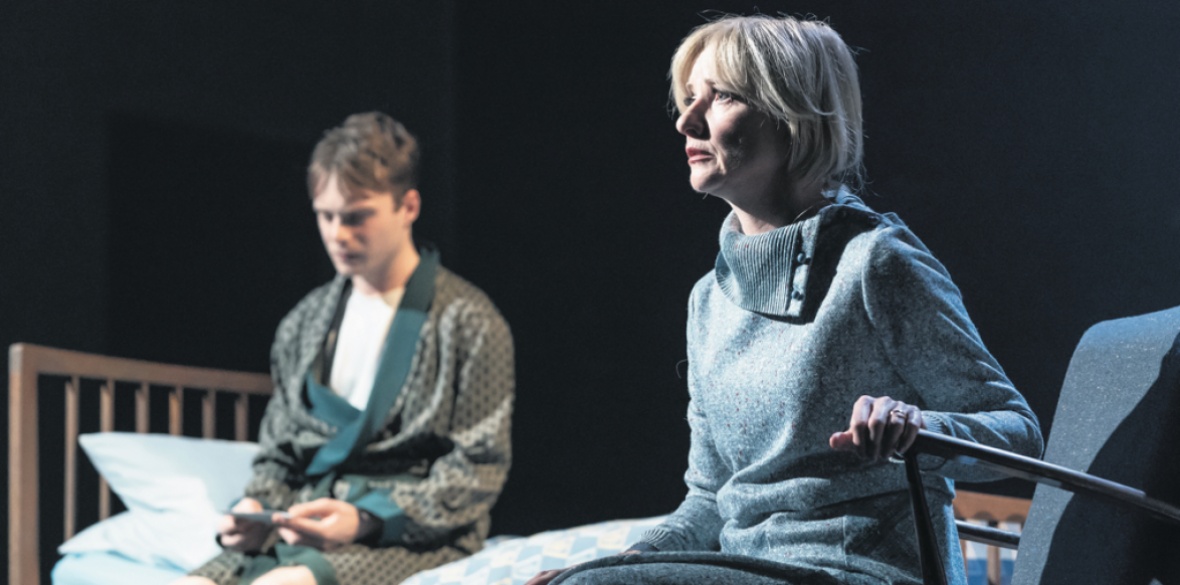This is the last article you can read this month
You can read more article this month
You can read more articles this month
Sorry your limit is up for this month
Reset on:
Please help support the Morning Star by subscribing here
Pinter Five and Pinter Six
Harold Pinter Theatre, London
THE JAMIE LLOYD Company’s parade of Pinter short plays and monologues, a tribute to the writer who died 10 years ago, goes from strength to strength.
Pinter Five, directed by Patrick Marber, begins with The Room, the playwright’s first-ever work from 1957. With its miserable gas fire, filthy windows, drab functionality, fearful anonymity and menace, it’s disturbingly evocative of the period.
The play’s tension never falters as Rose (Jane Horrocks) and her husband (Rupert Graves) fail to communicate — she through a torrent of continuous gabble, he through a persistent and threatening silence.
Terrified of the world both outside and within, and of the strange assortment of individuals who may or may not be living in the basement, Rose is the personification of poverty and the abused and battered woman for whom life is terror.
Grim in tone but masterly in execution, the play stumbles to an inevitably violent end.
Victoria Station, by contrast, is pure comedy. Focusing on what should be a routine, unremarkable interchange between a taxi driver (Graves) and the office call manager (Colin McFarlane), it exposes something almost mystical about the nature of conversation and how even the simplest of words can elicit the most unlikely of responses.
The visual effect of the two men floodlit in separate spaces on a darkened stage, the immaculate timing and the wonderfully inventive script make for hilarious theatre.
Family Voices, originally written for radio, is an ingenious construct. Examining the alienation of a young man (Luke Thallon) from his doting but exacting mother (Horrocks) and his dead but still judgmental father (Graves), it’s a deeply engrossing lesson in dramatic revelation.
Pinter Six, directed by Jamie Lloyd, brings us two plays from 1991 and 2000 respectively. Both are performed by the same cast — John Simm, Phil Davis, Celia Imrie, Ron Cook and Gary Kemp — and both revisit themes from the earlier works.
Our enjoyment, though, stems from their study of two contrasting social groups, both of which Pinter mercilessly exposes as despicable. Party Time has a group of philistine, casually rich would-be fascists in a supposedly social and clubbable environment, while Celebration is set in a restaurant where over-dressed, over-glitzy and loud-mouthed vulgarians display their ignorance and downright boorishness with gross abandon.
In both plays, the behaviour is frighteningly recognisable and the characters oblivious to higher human traits, while the playwright lambasts them from superior, sophisticated and even snobbish heights.
Some of these short pieces might not have survived in isolation but, together, they showcase Pinter’s unique talent and the art form he created. Unexpected and ground-breaking, they are dark and dangerous, light-hearted and comic.
Making the ordinary extraordinary and the painful absurd, they are both snapshots of ordinary lives and social histories and political commentaries and this is a once-in-a-lifetime opportunity to see them at their best.
Mostly, though, they bring us that rare treasure — a glimpse of genius. A true gift.
Run until January 26, box office: pinteratthepinter.com












